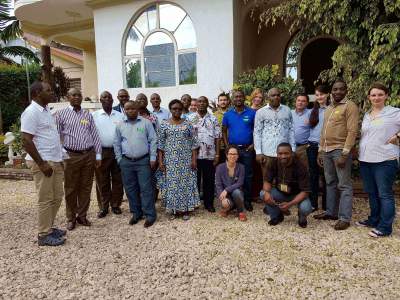Start Network's Kat Reichel discusses the latest Start Fund decision making groups.
This last week, we have had three more Start Fund Decision Making Groups set up in Senegal, Cameroon and DRC. These groups, also running in Kenya, Nigeria, Myanmar and Pakistan, are a concrete example of how the Start Network is localising humanitarian response, by enabling people closest to where crises happen make decisions on where and how funding is spent.
Claire Parfoundry from Concern Worldwide and Audrey Laffitte from Christian Aid delivered the workshops – which is an excellent example of Members transferring their experience to expand the reach of the Start Network.
The feedback I have received is that the workshops were quite positive. Some groups saw a use for the Network collaborative culture, as there was a lack of trust between NGOs in country. There was also feedback that the “cloak” of the Network could help engage with the government, when at times it can be difficult to deliver much needed relief.
There were some concerns on either end of the spectrum – from “what happens if too many of us what to engage” to “what happens if none of us can?” The timeline of the Fund can be quite daunting – with senior staff only given 12 hours to mobilise a project selection meeting. The size of the groups impacts this – for instance, there are over 20 people in DRC to only 7 people in Cameroon. However, it remains to be seen whether the size of the group will impact engagement. Kenya, for instance, has over 30 participants – and at times this has been a struggle to get quorum for project selection. Others, like Nigeria, only have 10 people have had an 80% participation rate and have attended meetings beyond those of their own responsibility as a group.
This leads to a bigger questions about engagement of in-country staff. What if – like Myanmar – there are no alerts raised to the Fund? Or potentially slow to no engagement in Cameroon? In the team, we think that this doesn’t mean that these groups are not fully engaged, but may mean that a different part of the Fund or Network could be explored. In Myanmar, there seems to be some interest in piloting community influence within project selection.
In Cameroon, there could be a way to bring in more local partners or deputies to the group. They may also want training super forecasters to better predict disasters that affect the country. We may also be able to engage them on other streams of the Network – either drought insurance mechanisms or DEPP projects that may be unfolding in their country. It is this phased or multi-spoke approach that we are exploring and monitoring in the Fund and wider Network team.
The next decision making groups will be set up in Bolivia and Malawi by August 2016. Thereafter we will have groups in Bangladesh and Indonesia by the end of September 2016. The full list of decision making groups is:
- Bolivia
- Cameroon
- DRC
- Indonesia
- Kenya
- Malawi
- Myanmar
- Nigeria
- Pakistan
- Philippines
- Senegal
- Somalia
Read more about the Start Fund.
Read more about the decision making groups in Myanmar and Pakistan.

